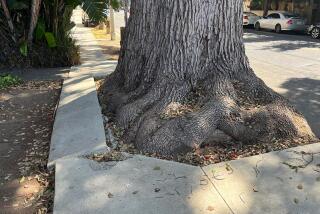New Assembly Chairmen Have Lot to Digest
SACRAMENTO — The day after Assemblyman Richard Katz (D-Sepulveda) was appointed chairman of the Assembly Transportation Committee this year, the paper blizzard began.
Strangers began dropping off tomes on such subjects as highway finance, rapid transit systems and potholes. Within the first week, the reports, if stacked on a basketball court, could have reached the net.
“Look at this! This is the first thing they gave us,” said Kathy Fletcher, Katz’s senior consultant, holding up a chart of Byzantine proportions entitled “Budgetary Flow of California State Fees and Taxes Designated by Law for Transportation Authorized Purposes (Systems).”
Frequent Acronyms
The people who deliver these reports to Katz--one of three Valley-area legislators who is learning for the first time what it means to chair a standing Assembly committee--tend to clip their conversations with acronyms. They chat about the looming economic crunch endangering the stability of the “STIP” or the nuances of the “TP&D.;”
“You practically need a decoder ring to decipher it,” observed Katz, a printer and graphic designer by trade.
Besides Katz, the new Valley chairmen who were appointed in January are Gray Davis (D-Sherman Oaks), who heads the Housing and Community Development Committee, and Cathie Wright (R-Simi Valley), chairwoman of the newly resurrected Intergovernmental Relations Committee. Since Assembly Speaker Willie Brown (D-San Francisco) announced the chairmanship assignments, the neophyte chairmen from the Valley have set about to become instant experts in their fields.
The subjects the three will tackle this year are timely, if disparate. Highway financing, the plight of the homeless and the proposed cutoff of federal revenue sharing funds are some.
Headaches, Challenges
Each of the committees poses its own special headaches and challenges.
Wright, for instance, had no inkling at first about what her committee--abandoned in the 1970s, apparently for a lack of interest--was supposed to do.
Her committee apparently was revived in a maneuver by Brown to strengthen his power base by increasing the number of standing Assembly committees from 23 to 30. More committees mean more chairmen, which mean more politicians indebted to the speaker. After freezing the Republicans out of chairmanships during the last session, Brown appointed four minority Republicans, including Wright, to committee chairmanships in appreciation of the GOP Assembly members support of his return as speaker.
Undismayed by the committee’s lackluster history, which she discovered upon looking into her duties as its chairwoman, Wright says she wants to carve out her own niche. As she envisions it, the committee “can make a tremendous contribution” by keeping an eye on what the federal government and other states are doing that could affect California.
The first thing Wright plans to look at is what effect the proposed demise of the $4.6-billion program of sharing general revenue with local governments would have in California.
But perhaps her trickiest job will be to avoid encroaching on any other chairman’s territory on such subjects. The Local Government Committee, for instance, will be holding hearings on what the death of revenue sharing would do to California cities and towns.
“I’m not trying to take anything away from their jurisdiction,” Wright said. Because she expects few bills to be sent to her committee for review, she said the panel will have the luxury of having more time than others to examine issues comprehensively.
The post, however, has not caused Wright to be assigned more office space, an in-house gauge of prestige in Sacramento. Wright’s newly hired committee consultant will be working out of her office closet, albeit one that will be expanded to offer a little more elbow room.
Of the three, Katz probably has the most complex subject to master.
M. Mehdi Morshed, the principal consultant of the Senate Transportation Committee, said only one man in the Legislature, Sen. John F. Foran (D-San Francisco), has truly mastered the subject. Foran, who has chaired the committee since 1978, has been a transportation junkie since 1963, when the then-freshman assemblyman was placed on the Assembly Transportation Committee.
Morshed said it typically takes a chairman one to two years to become comfortable with the subject because of its complexity, the volume of paper work and the system’s magnitude. The state has 123,000 miles of local roads, more than 40,000 miles of highways, and, says Foran, millions of potholes.
Katz, who will be dealing with hundreds of special interest groups, said he learned one lesson quickly: Many of the transportation industry representatives who walk the halls in the Capitol have tunnel vision.
“I find it to be a very entrenched fraternity that tends to measure success in cubic feet of concrete poured,” Katz said. “The days of large public-works taxpayer projects are over.”
Creative Financing
Katz said he will be seeking the aid of business and civic groups in searching for creative ways to finance California’s transportation needs.
If the Legislature doesn’t come up with money for already scheduled capital improvement and highway rehabilitation programs, the state will fall $150 million shy of meeting its capital improvement needs by 1987 and $600 million short the next year, Katz said. He said that would mean a loss of $2 billion to $4 billion in matching federal funds.
Foran is advocating an extra 5-cent sales tax on gasoline to fill the gap, but Katz, the rookie, said he wants to look at alternatives.
Katz said he believes industry lobbyists are already sizing him up. After his first hearing, Katz said, “There were rumors they were testing me.” Numerous special-interest groups, including the farm lobby, the trucking industry and manufacturers, wanted the Assembly Transportation Committee to ask the California Highway Patrol not to enforce a law banning trucks from some roads.
“It was an absurd request not to enforce the law,” Katz observed.
Experience on Committee
Perhaps Davis will have the easiest time adjusting. During the last session, Davis was vice chairman of the Housing and Community Development Committee he now chairs. Although he represents an affluent district, his committee concentrates on the concerns of the lower-middle-class, the poor and the homeless.
Davis said one of his priorities will be to explore ways the state, through creative financing, can provide residents with reasonably priced housing. According to Davis, only 10% of the renters in Los Angeles can afford the average-priced home ($115,000) in Los Angeles.
Helping people buy homes, Davis said, is especially crucial in light of President Reagan’s desire to place a two-year freeze on new federally subsidized housing.
Hearing on Homeless Set
“I’m hoping this committee can chart a new course that will help young people find their niche in the California housing market,” said Davis, who also will hold a hearing next month on the homeless.
Despite the serious problems of the state demanding their attention, the new chairmen occasionally must deal with the absurd. Katz found out that it wasn’t the weighty subjects of highway financing or subway systems that brought the most comments. It was something known among politicians as an in-joke for constituent-pleasing: the fixing of potholes.
It seemed that everyone Katz bumped into had a pothole in front of his house that needed filling.
More to Read
Get the L.A. Times Politics newsletter
Deeply reported insights into legislation, politics and policy from Sacramento, Washington and beyond. In your inbox three times per week.
You may occasionally receive promotional content from the Los Angeles Times.









